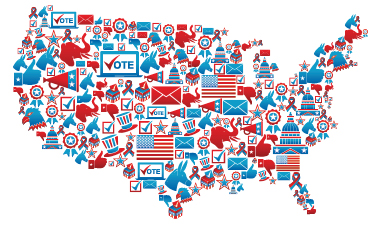
By Martha Perego
In case you were off hiking a remote mountain or consumed by the details of completing a budget, you may have noticed that the summer hiatus from the political drama never happened. All the more reason to consider how you will deal with the slew of political issues and challenges headed our way between now and November 8.
Tenet 7 of the ICMA Code of Ethics and its related guidelines offer members considerable direction for navigating what is often a thin line between the big and small “p” world of politics. That said, the nuances of handling work and politics in a public setting can present interesting challenges.
Here are some common scenarios and hopefully useful advice:
Q. My work on community engagement brings me in close contact with the county commissioners. During the primary, the board chair offered me a free ticket to the local party fundraiser. Even though this is pretty much a single-party town, there was no way that I was taking a ticket during a contested primary.
But heading into the general election with a party nominee, what’s the harm in accepting this social invitation, especially if I don’t have to pay for the ticket?
A. This is all about appearances and not the details. You aren’t off the hook here just because someone else actually paid for the ticket that will be used to fund partisan party activities.
Do you really want to be viewed as aligned with the board chair and the commissioners? Or is your professional reputation and contribution actually better served by being viewed as nonpolitical and aligned with the staff?
Q. My community has a sizable population of immigrants, some here legally, some not. Since this is a national issue, our city council hasn’t taken any official position. Most recently, it did issue a public statement to assure the public that a person’s right to benefit from police services is not contingent upon citizenship or immigration status.
Given the gap between the positions outlined by the presidential candidates and the consequential daily impact of indecision, this is no time to sit silently on the sidelines! Can I publicly express my opinion on this issue?
If I don’t outright endorse or reject a candidate, can I at least say what I think about their positions on this one issue?
A. The guideline on personal advocacy of issues makes it clear that ICMA members do not lose their right to express their opinion:
“Members share with their fellow citizens the right and responsibility to voice their opinion on public issues. Members may advocate for issues of personal interest only when doing so does not conflict with the performance of their official duties.”
If you want to advocate for a position, you can do so. First, make it clear that the opinion you offer is your own. Second, don’t use public resources, including your official title, to support a personal stance.
You can join and/or make a financial contribution to an issue-oriented advocacy organization; participate in a campaign designed to raise awareness; and put a bumper sticker on your car (just not on a city-issued one).
In the current climate where expressing a position often equates to party labeling, it’s wise to at least consider the consequences of speaking out. It’s not a reason to stand down or stay silent. Just something to consider.
As to the question about calling out a specific candidate’s stance on the issue? That gets more complicated. You can always argue that you are just sharing a message.
But does sharing a comment in the middle of a campaign season at a minimum violate the spirit of the Code? After all, the distance between “I like what the candidate says” and “I support the candidate” can be pretty short.
Q. As they say, this is not my first rodeo managing facilities for a city. Living in a state that many regard as “in play” for the upcoming presidential campaign is a new experience.
The campaigns are already looking to book our facilities for campaign stops this fall and collecting names for the invites. How do I do my job and be politically neutral?
A. Treat every request as you would any other and be evenhanded in applying the existing policies to any campaign coming to town.
Provide the campaign staffers with the contact info for your elected officials. If there is a business purpose for you to be on-site during an event, stand in the back not on the dais. Adopting a low profile will enable you to stay out of the politics spotlight.
Think carefully about what you have the right to do and what is the right thing to do. And about how your conduct will be viewed by others. Attending a public candidate debate or an event to hear a candidate speak won’t raise an eyebrow. Standing on the dais, having your picture taken with the candidate, or wearing the candidate’s t-shirt in public will.
[Part 1 of this series was published in the August 2016 issue of Public Management magazine.]
New, Reduced Membership Dues
A new, reduced dues rate is available for CAOs/ACAOs, along with additional discounts for those in smaller communities, has been implemented. Learn more and be sure to join or renew today!
